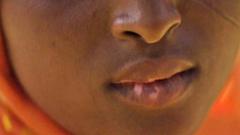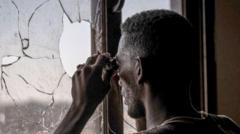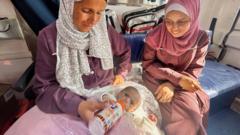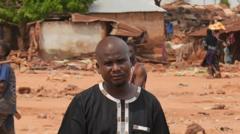In a poignant interview, Fatima, a 32-year-old mother from Kano, Nigeria, recounts the emotional and physical scars left on her six children after using skin-lightening creams under familial pressure. Her story highlights the cultural obsession with lighter skin and the grave dangers of unregulated cosmetic products.
Mother Regrets Using Skin-Lightening Creams on Children: A Cautionary Tale

Mother Regrets Using Skin-Lightening Creams on Children: A Cautionary Tale
A Nigerian mother shares her heartbreaking experience of applying skin-whitening products on her six children, revealing the serious consequences they face.
In northern Nigeria, a mother reflects on her painful choices involving skin-lightening creams that have left lasting scars on her six children. Fatima, 32, holds her two-year-old son, whose face and legs bear burns and discolored patches from the creams she used after feeling pressured by her family. Regretting her decisions, she recounts how one of her daughters has become so self-conscious about her appearance that she now covers her face whenever she leaves the house.
The societal fixation on lighter skin in Nigeria, where 77% of women reportedly use such products according to the World Health Organization (WHO), played a significant role in Fatima’s troubling choices. Initially, the creams seemed to garner favor from her mother, who preferred lighter-skinned grandchildren, but the adverse effects soon surfaced: burns, scars, and persistent skin ailments.
Fatima’s harrowing experience is not unique. In Nigeria, skin-whitening products often contain harmful ingredients like corticosteroids, hydroquinone, and even mercury, substances that should require a doctor’s prescription. With an alarming rate of cosmetic harm among children, the National Agency for Food and Drug Administration and Control (Nafdac) declared a state of emergency concerning skin-whitening products in 2023.
Zainab Bashir Yau, a dermatologist in Abuja, notes that many mothers are repeating a cycle of bleaching their children, believing it will shield them from societal discrimination associated with darker skin tones. Fatima’s daughters, aged 14 and 16, have suffered discrimination themselves, as the visible signs of their skin treatments led to assumptions about drug use, further complicating their lives and potential future relationships.
During a market visit in Kano, Fatima witnessed alarming trends, including "mixologists" crafting skin-lightening creams with unregulated ingredients, and mothers purchasing products for their children without understanding the risks involved. Many believe that light skin equates to beauty and success, often ignoring the severe side effects of these products.
Despite her remorse, Fatima remains dedicated to spreading awareness to other parents about the potential dangers of skin-lightening treatments. As her children continue to heal from the damage inflicted on their skin, she hopes that her experience will serve as a warning to others caught in the same cultural web of beauty standards. Her story serves as a poignant reminder of the need for education and awareness regarding the use of cosmetic products, particularly among vulnerable populations.




















